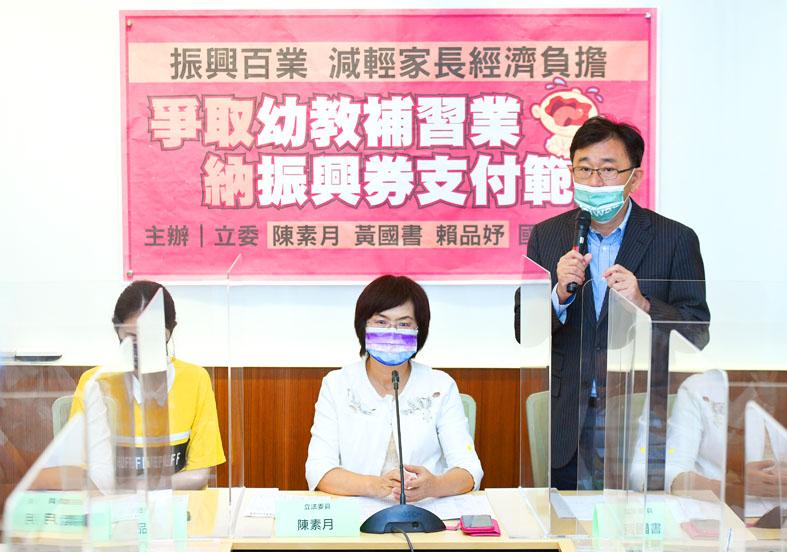The next round of government COVID-19 stimulus vouchers should include childcare centers and cram schools, Democratic Progressive Party (DPP) lawmakers said yesterday.
The Executive Yuan on Thursday released details on the relief plan — which largely resembled its predecessor, the Triple Stimulus Voucher program, which was focused on the boosting food, retail and tourism industries — but it did not include making vouchers payable to kindergartens, childcare centers or cram schools that were hard-hit by level 3 COVID-19 restrictions in effect from May to last week, DPP Legislator Chen Su-yueh (陳素月) told a news conference in Taipei.
These enterprises should be included as payable to parties in the new voucher program, as many are going out of business and some have already been forced to close, she said.

Photo: Liao Chen-huei, Taipei Times
Kindergartens and cram schools are an important part of the economy that provides many jobs, DPP Legislator Huang Kuo-shu (黃國書) said.
There are 4,000 private kindergartens and 18,000 cram schools in Taiwan, many of which have been closed, but have kept employees on paid leave, he said, adding that bankruptcies in the sector would have consequences for the overall economy.
Vouchers would help take some economic pressure off parents, who spend about 10 percent of their household income on education, he said.
Newly unemployed young people who are taking classes in cram schools to prepare to pursue degrees and certifications would also benefit from vouchers, he added.
After being on unpaid childcare leave amid outbreak restrictions, many parents have little money left to put their children in cram school or childcare centers when they reopen next month, DPP Legislator Lai Pin-yu (賴品妤) said.
Chang Yu-chuan (張有傳), president of the National Association of Continuing Education of Taiwan, said that most big cram schools have paid their staff full salaries and offered online classes to during the level 3 alert.
“We hope the Executive Yuan’s new voucher program would include our industry and give it the boost it needs to recover from COVID-19,” he said.
National Parents Education Volunteers Association chairman Wu Fu-pin (吳福濱) said that many parents are dreading childcare and cram school bills next month.
“I believe that Taiwanese families would be grateful for a policy that helps the economy and takes the pressure off parents,” Wu said.
Chang Hao-jan (張浩然), director of the Taipei Supplementary Education Association, said that COVID-19 restrictions have led to serious losses for cram schools.
“There is much groaning and gnashing of teeth, as 60 percent of our business has to do with elementary-school students who cannot do online learning,” he said.
“Students have been demanding refunds since May, while our rent, utility and human resource costs keep piling up. I am afraid this will trigger a rash of bankruptcies,” he added.
Huang Yueh-ying (黃月盈), an official at the National Development Council, said the voucher program is a work in progress and that the lawmakers’ suggestion would be considered.

Alain Robert, known as the "French Spider-Man," praised Alex Honnold as exceptionally well-prepared after the US climber completed a free solo ascent of Taipei 101 yesterday. Robert said Honnold's ascent of the 508m-tall skyscraper in just more than one-and-a-half hours without using safety ropes or equipment was a remarkable achievement. "This is my life," he said in an interview conducted in French, adding that he liked the feeling of being "on the edge of danger." The 63-year-old Frenchman climbed Taipei 101 using ropes in December 2004, taking about four hours to reach the top. On a one-to-10 scale of difficulty, Robert said Taipei 101

Nipah virus infection is to be officially listed as a category 5 notifiable infectious disease in Taiwan in March, while clinical treatment guidelines are being formulated, the Centers for Disease Control (CDC) said yesterday. With Nipah infections being reported in other countries and considering its relatively high fatality rate, the centers on Jan. 16 announced that it would be listed as a notifiable infectious disease to bolster the nation’s systematic early warning system and increase public awareness, the CDC said. Bangladesh reported four fatal cases last year in separate districts, with three linked to raw date palm sap consumption, CDC Epidemic Intelligence

Two Taiwanese prosecutors were questioned by Chinese security personnel at their hotel during a trip to China’s Henan Province this month, the Mainland Affairs Council (MAC) said yesterday. The officers had personal information on the prosecutors, including “when they were assigned to their posts, their work locations and job titles,” MAC Deputy Minister and spokesman Liang Wen-chieh (梁文傑) said. On top of asking about their agencies and positions, the officers also questioned the prosecutors about the Cross-Strait Joint Crime-Fighting and Judicial Mutual Assistance Agreement, a pact that serves as the framework for Taiwan-China cooperation on combating crime and providing judicial assistance, Liang

US climber Alex Honnold left Taiwan this morning a day after completing a free-solo ascent of Taipei 101, a feat that drew cheers from onlookers and gained widespread international attention. Honnold yesterday scaled the 101-story skyscraper without a rope or safety harness. The climb — the highest urban free-solo ascent ever attempted — took just more than 90 minutes and was streamed live on Netflix. It was covered by major international news outlets including CNN, the New York Times, the Guardian and the Wall Street Journal. As Honnold prepared to leave Taiwan today, he attracted a crowd when he and his wife, Sanni,